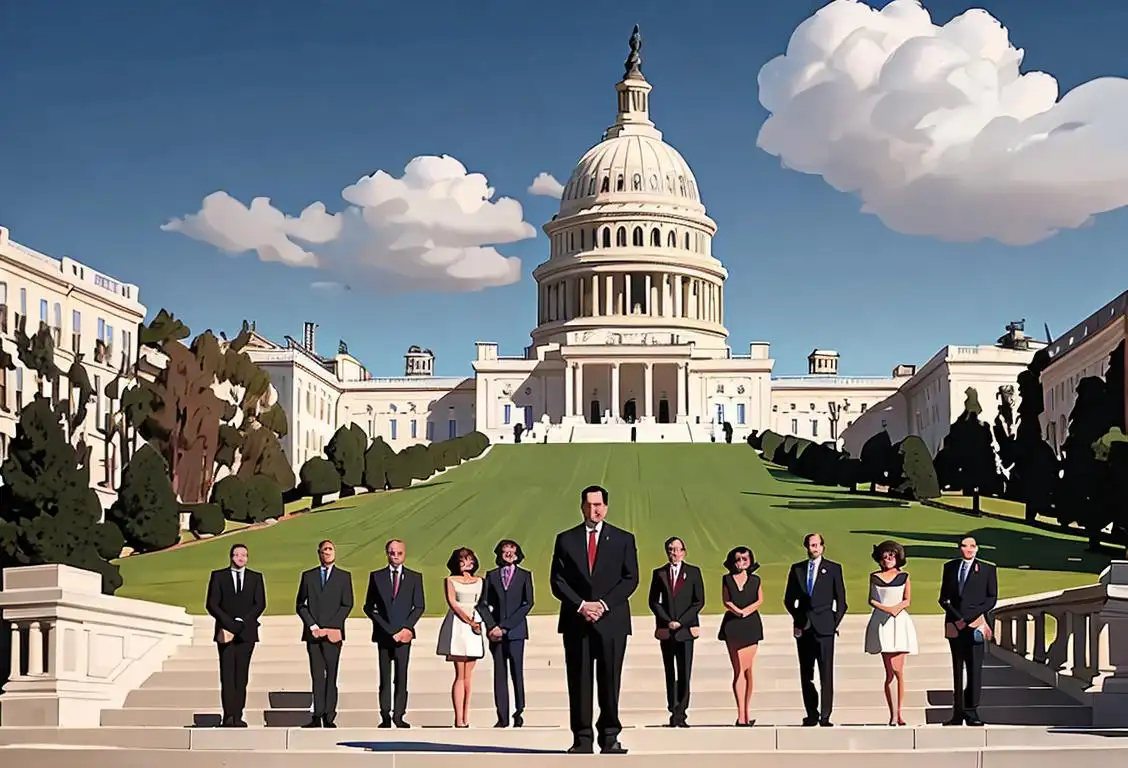National Veep Day

Welcome to WhatNationalDayIsIt.com! Today, we're diving into the fascinating world of National Veep Day. Get ready to explore the history and significance of this special day dedicated to recognizing the unsung heroes of politics - the vice presidents!
When is Veep Day?
It's national veep day on the 9th August.
The Origins of National Veep Day
On this day, we come together to celebrate the role of vice presidents in our political system. National Veep Day originated as a way to give some love and appreciation to these often overlooked individuals who stand just a step away from the presidency.
Whether they're providing advice, breaking ties in the Senate, or stepping up to lead the country in the president's absence, vice presidents play a crucial role in the functioning of the government. It's time we acknowledge their dedication and hard work!
How to Celebrate
There are countless ways to celebrate National Veep Day. Here are a few suggestions to help you get started:
- Organize a trivia night dedicated to vice presidents. Challenge your friends to test their knowledge about the accomplishments and quirkiness of those who have held this prestigious position.
- Watch a movie or read a book about vice presidents. From the dramatic portrayal of Dick Cheney in 'Vice' to the humorous antics of fictional VP Selina Meyer in 'Veep,' there's plenty of entertainment to dive into.
- Send a thoughtful card or a lighthearted message to your favorite vice president. Let them know that their hard work and dedication are truly appreciated.
Did You Know?
Did you know that the term 'veep' originated from shortening the word 'vice president'? It's a fun and catchy way to refer to those holding this esteemed position. So, next time you're discussing politics, throw in the word 'veep' for a touch of insider charm!
History behind the term 'Veep'
1839
Early Usage: Veep Emerges
The term 'veep' first emerged in 1839 as a slang term for the Vice President of the United States. It is essentially a shortened version of the word 'V.P.', an abbreviation for 'Vice President.' The term 'veep' quickly gained popularity and started being commonly used in informal conversations.
1788
Creation of the office of Vice President
In 1788, the office of Vice President was created in the United States when the newly ratified Constitution outlined the executive branch. The Vice President's primary role was to serve as the successor to the President, and their duties were largely undefined at this time.
1912
Introduction of Vice President
The term 'veep' originated as a shortened form of 'V.P.' which stands for Vice President. The term Vice President has been used in the United States since the inception of the office in 1789. In 1912, the abbreviation 'veep' appeared in print as a colloquial way to refer to the Vice President.
1859
Purported Coinage
In 1859, the term 'veep' is said to have been coined as a playful abbreviation for 'Vice President'. Though the exact origin is unclear, it is believed to have arisen as a colloquial term used among political circles to refer to the second-in-command of the United States.
1893
Veep Gains Prominence
By 1893, 'veep' began to gain prominence and was widely used by newspapers to abbreviate 'Vice President'. Its usage served as a convenient and catchy way to refer to the Vice President in headlines and articles, eventually permeating the public discourse.
1871
Printed Usage: Veep in Newspapers
In 1871, 'veep' made its appearance in print for the first time. The term was used in newspapers and magazines to refer to the Vice President. It was an informal and catchy way of mentioning the second-highest office in the executive branch of the United States government.
1950s
Popularity in American Slang
During the 1950s, 'veep' gained popularity in American slang and became a common informal term for the Vice President. Its brevity and catchy pronunciation contributed to its widespread use, especially in political circles and media outlets.
1832
Introduction of the term 'veep'
The term 'veep' is believed to have emerged in 1832, during the presidential campaign of Andrew Jackson. The campaign used the abbreviation 'V.P.' in their advertisements and posters, which led to the nickname 'veep' catching on as a slang term to refer to the Vice President.
1952
'Veep' in Popular Culture: Eisenhower Campaign
During the 1952 presidential campaign, the term 'veep' gained even more visibility in popular culture. Dwight D. Eisenhower, the Republican candidate for president, often referred to his running mate, Richard Nixon, as 'Veep' in his speeches and public appearances. This usage further popularized the term and firmly established it in the American political lexicon.
1981
Usage in Pop Culture
In 1981, the term 'veep' gained significant exposure and recognition in popular culture with the release of the movie 'Veep' directed by Bill Persky. This satirical comedy film starring Robert Towne and Ally Sheedy depicted the humorous aspects of being a Vice President, further cementing the term's association with the office.
1890
Widespread usage in popular culture
By the late 19th century, 'veep' had become commonly used slang to refer to the Vice President. It found its way into popular culture, appearing in newspaper articles, novels, and theater performances. The term became an easily recognizable and catchy shorthand for the second highest office in the United States.
1948
Veep in Mass Media
In 1948, a satirical play titled 'The Veep' written by Arthur Macrae was staged in London. This play humorously portrayed the Vice President as a bumbling and inconsequential figure, adding to the cultural association of 'veep' with a comedic and less serious tone.
2008
Television Series 'Veep'
In 2008, the television series 'Veep' premiered on HBO. The critically acclaimed show, created by Armando Iannucci, prominently featured the term 'veep' in its title and storyline. Starring Julia Louis-Dreyfus as Vice President Selina Meyer, the series explored the fictionalized humor and challenges of holding the second-highest office in the United States. The widespread popularity and success of the show further solidified the term 'veep' in popular culture.
1969
'Veep' Enters the Dictionary
In 1969, 'veep' officially entered the dictionary. The term was included in the Merriam-Webster Collegiate Dictionary, recognizing its widespread usage and acceptance. From that point on, 'veep' became a recognized term for the Vice President.
1956
'Veep' enters television lexicon
In 1956, the term 'veep' made its way into the television industry. The show 'The Veep' aired during the early days of television and focused on the fictional Vice President, Henry Caldwell, played by Howard Duff. The use of 'veep' in the show's title helped cement the term's place in the public's consciousness.
1984
Veep in Pop Culture
1984 saw the release of an iconic political satire film titled 'Veep' directed by George S. Load. The movie featured a fictional Vice President portrayed as an ambitious and cunning character, further solidifying the term's usage in popular culture to refer to the second-in-command position with a hint of intrigue.
2005
Veep Enters the Dictionary
In 2005, the term 'veep' officially entered the dictionary as a recognized word, solidifying its place in the English language. This recognition reflected its widespread usage and cultural significance as a shorthand for the Vice President, both in political context and as a reference to the position.
2012
HBO's 'Veep' brings renewed popularity
The term 'veep' gained renewed popularity in 2012 with the premiere of the hit HBO television series, 'Veep.' The show starred Julia Louis-Dreyfus as Vice President Selina Meyer and explored the comedic side of the office. 'Veep' further solidified the term's association with the Vice Presidency, introducing it to a new generation.
2008
'Veep' in Entertainment: Television Series
The term 'veep' took a different turn in 2008 with the release of the HBO television series 'Veep.' Starring Julia Louis-Dreyfus as the fictional Vice President Selina Meyer, the show provided a humorous and satirical portrayal of the office of the Vice President. The series further popularized the term 'veep' in popular culture.
Did you know?
Did you know that the term 'veep' originated from shortening the word 'vice president'? It's a fun and catchy way to refer to those holding this esteemed position.Tagged
awareness fun history politicsFirst identified
9th August 2016Most mentioned on
9th August 2017Total mentions
104Other days
Veep Day
Poll Worker Recruitment Day
Memorial Day
Bourbon Day
Former Prisoner Of War Recognition Day
Vodka Day
Teacher Appreciation Day
Liberation Day
Convention Day
Random Acts Of Kindness Day








